5 Best CPAP Machines with Humidifier: Comparison & Buying Guide (2025)
Sleep apnea presents daily challenges, but the right CPAP (Continuous Positive Airway Pressure) machine transforms both your sleep quality and therapy consistency. Integrated heated humidifiers prove especially valuable during drier months or in arid climates, where standard CPAP therapy can leave airways feeling uncomfortable and irritated throughout the night.
Unlike CPAP units requiring separate attachments, these all-in-one CPAP systems feature built-in water chambers and heating elements that work seamlessly with your prescribed settings. This integrated approach means no extra setup, no compatibility concerns, and no additional equipment cluttering your nightstand.
In this guide, we’ll take a close look at the top CPAP machines that come equipped with integrated humidification systems, helping you make an informed decision for your sleep therapy needs.
Disclosure: This article is reader-supported and contains affiliate links.
Why Humidification Matters in CPAP Therapy
When you use a CPAP machine, a constant flow of pressurized air is delivered through your airways. This air helps keep your airway open, but it can also lead to dryness and irritation in your nose, mouth, and throat.
A humidifier adds moisture to the air, reducing these side effects and making your therapy more comfortable.
The added comfort from humidification can lead to better compliance with your treatment, which is essential for managing sleep apnea effectively. Many users report fewer instances of dry mouth, nasal congestion, and sore throat when using a CPAP machine with a built-in humidifier.
Top 5 CPAP Machines with Integrated Humidifiers
1. ResMed AirSense 11 AutoSet with HumidAir
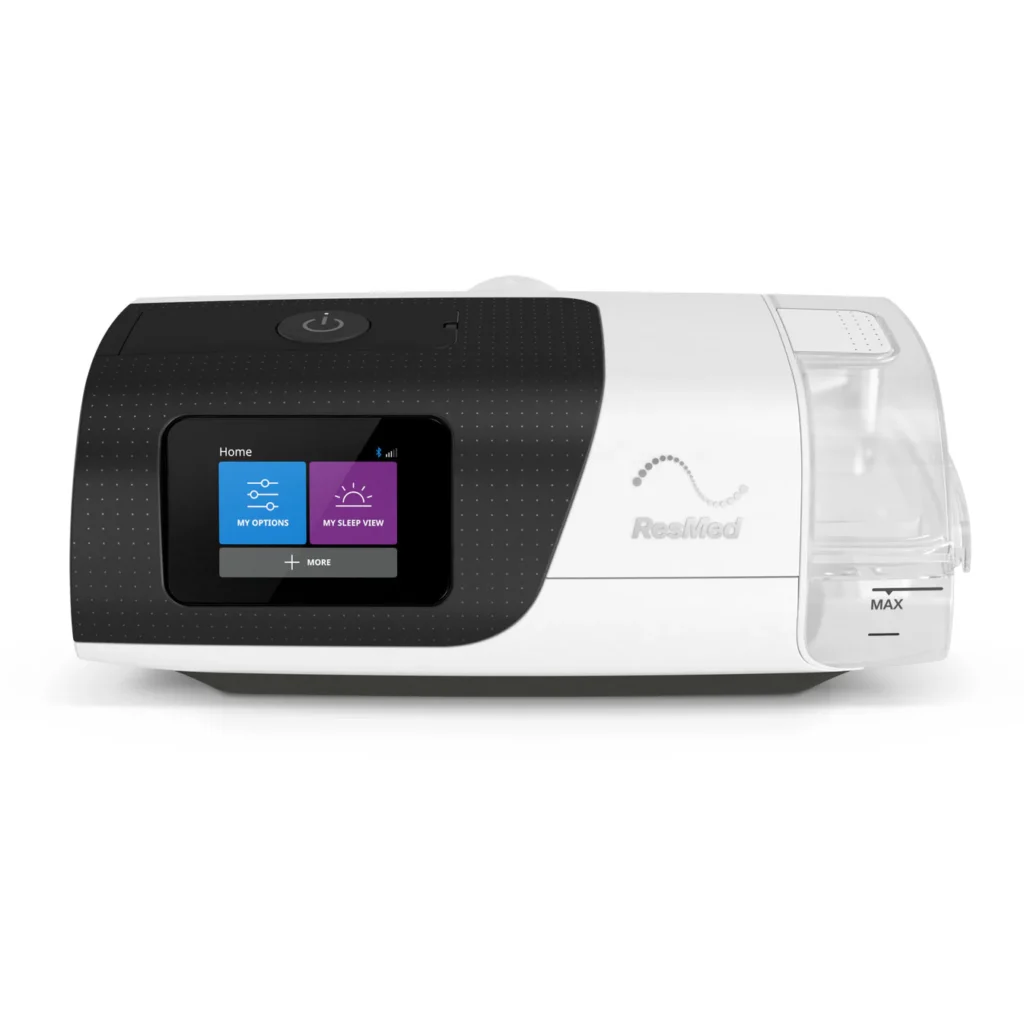
The ResMed AirSense 11 is a premium CPAP machine with an integrated heated humidifier. Its HumidAir technology provides excellent moisture delivery and temperature control, adapting to your environment to reduce the risk of rainout (condensation in the mask or tube).
Key Features:
- Includes the HumidAir 11 integrated heated humidifier
- Supports the ClimateLineAir 11 heated tube
- User-friendly touchscreen interface
- Quiet operation for undisturbed sleep
- MyAir app compatibility for comprehensive sleep data tracking
Pros:
- Integrated humidification with automatic climate settings
- Intuitive interface makes adjustments easy
- Whisper-quiet operation
- Detailed sleep data helps optimize therapy
Cons:
- Higher price point may not fit all budgets
- Larger size could be less convenient for travel
2. Luna G3 BiLevel 25A CPAP Machine with Integrated Heated Humidifier
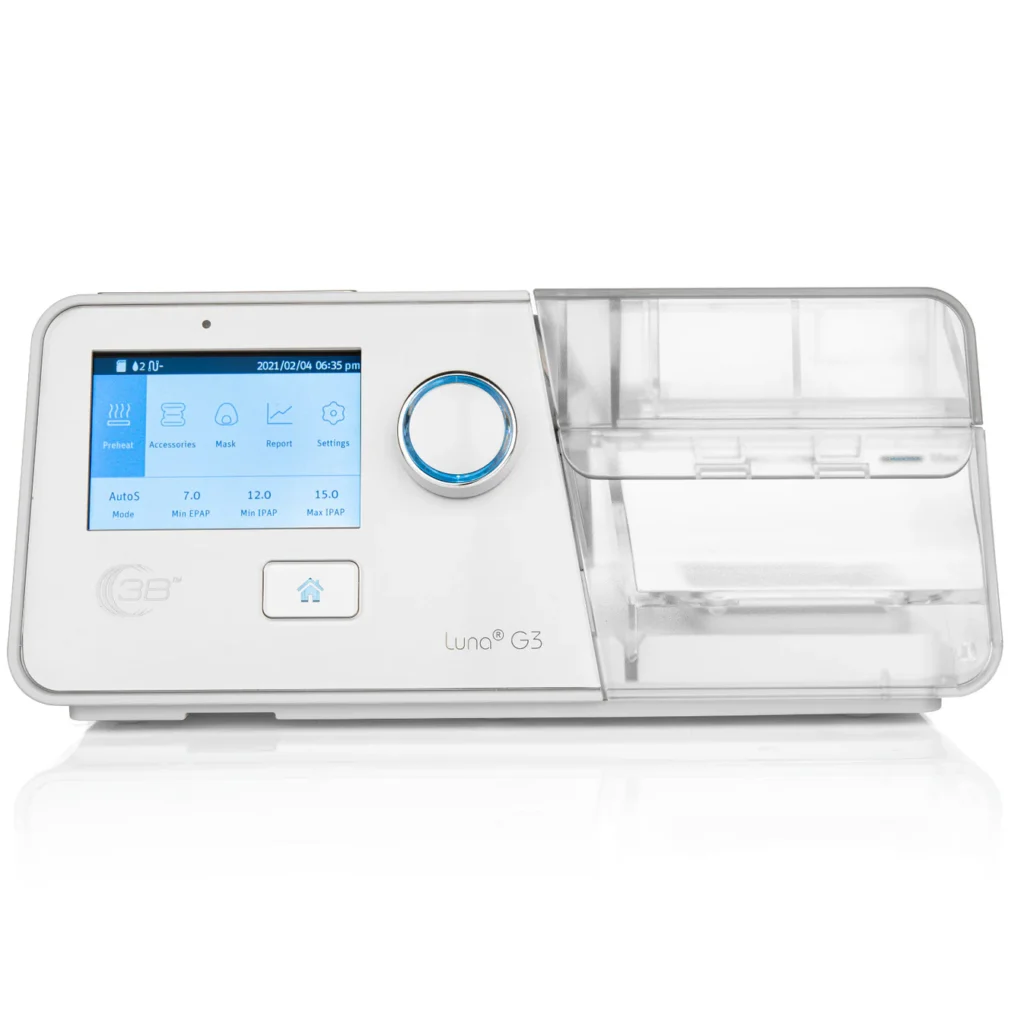
The Luna G3 is an Auto-CPAP with a built-in heated humidifier and pre-heat function.
It supports heated tubing, uses a 3.5″ full-color display with knob/button controls (not a touchscreen), and includes an integrated cellular modem for remote compliance reporting to the provider’s cloud platform iCodeConnect. It also offers Auto Ramp and a bedside clock.
Key Features:
- Integrated humidifier with pre-heat and large water capacity
- Heated-tubing support to help reduce condensation (“rainout”)
- Full-color screen (including clock) with simple dial-and-button interface
- Built-in cellular connectivity for automatic compliance uploads
- Quiet operation at 26 dBA
Pros:
- Convenient integrated humidifier and pre-heating for optimal comfort out of the box
- Heated-tube option helps mitigate dryness and rainout
- Remote compliance via onboard cellular makes it easy for provider monitoring
- Replaceable water chamber readily available from retailers.
Cons:
- Dial/button UI (some may prefer a touchscreen)
If you want an integrated heated humidifier with pre-heat, heated-tube support, and provider-friendly cellular reporting without paying for a premium ecosystem, the Luna G3 is a solid, full-feature choice. Just note the non-touchscreen interface and check current availability below.
3. Philips Respironics DreamStation 2 Auto CPAP Advanced with Humidifier
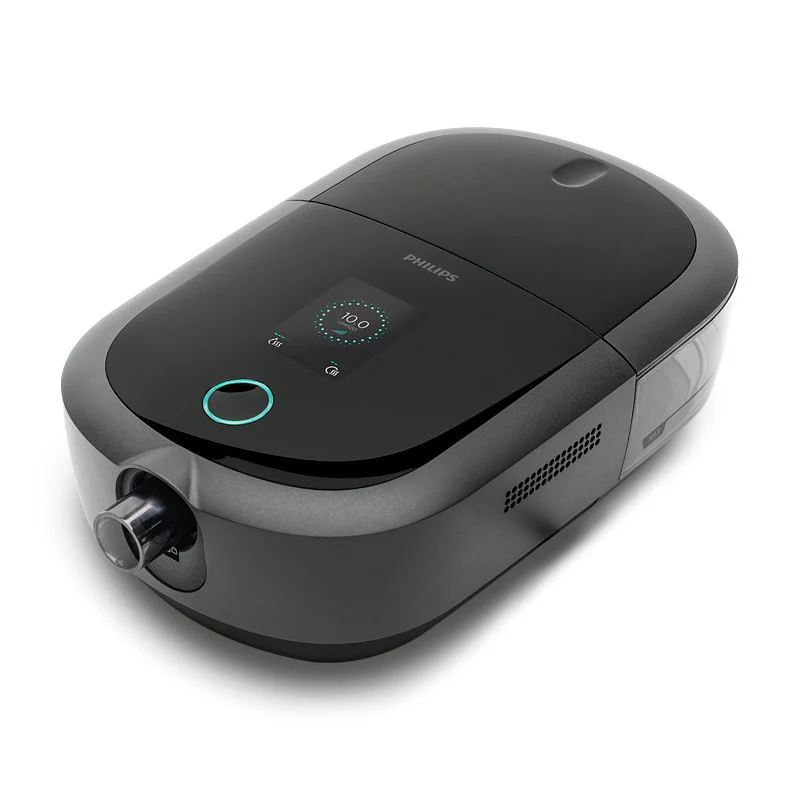
The DreamStation 2 is a compact, full-size CPAP with an integrated humidifier and adaptive humidification. It allows you to control the heated-tube temperature when using the optional heated tube. It also makes use of smart technology to optimize moisture delivery based on room conditions.
Key Features:
- The humidifier fine-tunes itself to maintain comfortable moisture and limit condensation
- Optional heated tube with temperature control
- More compact build than many full-size units
Pros:
- Space-saving design ideal for bedside tables
- Smart humidity adjustment for consistent comfort
- Simple maintenance with easy-to-clean components
Cons:
- Smaller water tank capacity may require more frequent refills
4. Fisher & Paykel SleepStyle Auto CPAP with Humidifier
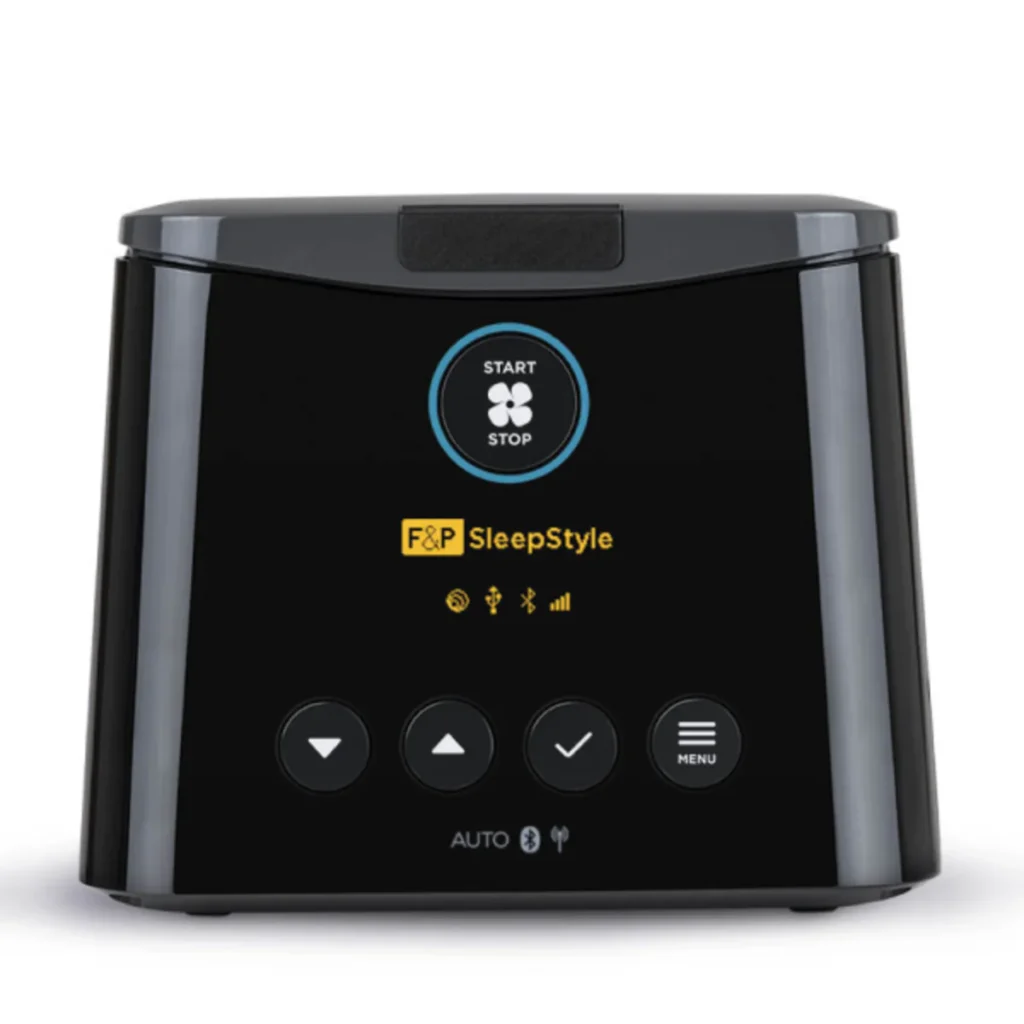
SleepStyle pairs ThermoSmart humidification with the AirSpiral heated tube to minimize condensation, and features SensAwake and expiratory relief comfort modes. It also has an easy-access water chamber that opens via a push-button for filling/cleaning.
Availability note (U.S.): F&P states it is no longer selling SleepStyle in the United States, though support continues for existing users.
Key Features:
- ThermoSmart humidification technology with heated breathing tube
- Auto-adjusting algorithm with central sleep apnea detection
- SleepStyle app for therapy tracking and personalized support
- Easy-to-clean design with dishwasher-safe components
- Quiet operation at 28 dBA
Pros:
- Excellent humidity consistency with ThermoSmart
- Convenient water chamber design
Cons:
- Current U.S. retail availability is limited/uncertain.
5. DeVilbiss IntelliPAP 2 AutoAdjust with Heated Humidifier
The IntelliPAP 2 offers a reliable CPAP experience with an effective heated humidifier. It’s known for its durability and consistent performance.
Key Features:
- PulseDose heated humidifier designed to reduce rainout.
- Auto-adjusting algorithm with data/reporting; color display.
Pros:
- Humidification approach aimed at minimizing condensation in tubing
- Straightforward interface for easy use
- Quiet performance for light sleepers
Cons:
- Fewer advanced features compared to premium models
- Humidifier may require more frequent refills
The IntelliPAP 2 focuses on durability and straightforward operation rather than advanced features. DeVilbiss builds this model for long-term reliability, making it a solid choice if you prioritize equipment that lasts and performs consistently over time.
The controls are simple and intuitive – important for those after effective humidification without complex settings or app connectivity. It operates quietly and delivers reliable moisture control at a competitive price point that works well if affordability is a consideration.
The water chamber may need more frequent refills compared to larger units, but this trade-off often comes with the more affordable pricing and compact design.
How to Choose the Right CPAP Machine with Humidifier
When evaluating CPAP machines with built-in humidifiers, there are several features you should keep in mind:
1. Humidification Capacity
The humidification capacity refers to how much moisture the device can add to the air. A higher capacity means the machine can provide more consistent humidification throughout the night, especially useful for those living in dry climates or using their CPAP for extended periods.
Look for machines that pair this with heated tubing compatibility—this combination maintains the temperature of humidified air as it travels to your mask, reducing condensation or “rainout” that can disrupt your sleep.
2. Auto-Adjusting Pressure
Many APAP machines can automatically adjust the air pressure based on your real-time breathing patterns, delivering only what you need at any given moment rather than constant high pressure.
This feature can significantly improve comfort and therapy effectiveness, as it provides only the necessary pressure at any given moment.
3. Noise Level
A quiet CPAP machine is crucial for uninterrupted sleep, both for you and your bed partner. Look for machines with noise levels below 30 decibels for the most peaceful experience.
Combine near-silent operation with smart features and connectivity, and you get machines that integrate seamlessly into your lifestyle through smartphone apps for tracking therapy data and remote adjustments.
4. Data Tracking and Reporting
Advanced CPAP machines offer detailed data tracking, including usage hours, AHI (Apnea-Hypopnea Index), mask fit, and more. This information can be invaluable for monitoring your therapy’s effectiveness and making necessary adjustments.
Don’t overlook practical considerations like ease of use and cleaning. User-friendly interfaces and dishwasher-safe humidifier chambers simplify your daily routine. If you travel frequently, travel-friendliness becomes crucial—some manufacturers offer compact designs or dedicated travel versions that pack easily without sacrificing performance.
Essential Features for CPAP Machines with Integrated Humidifiers
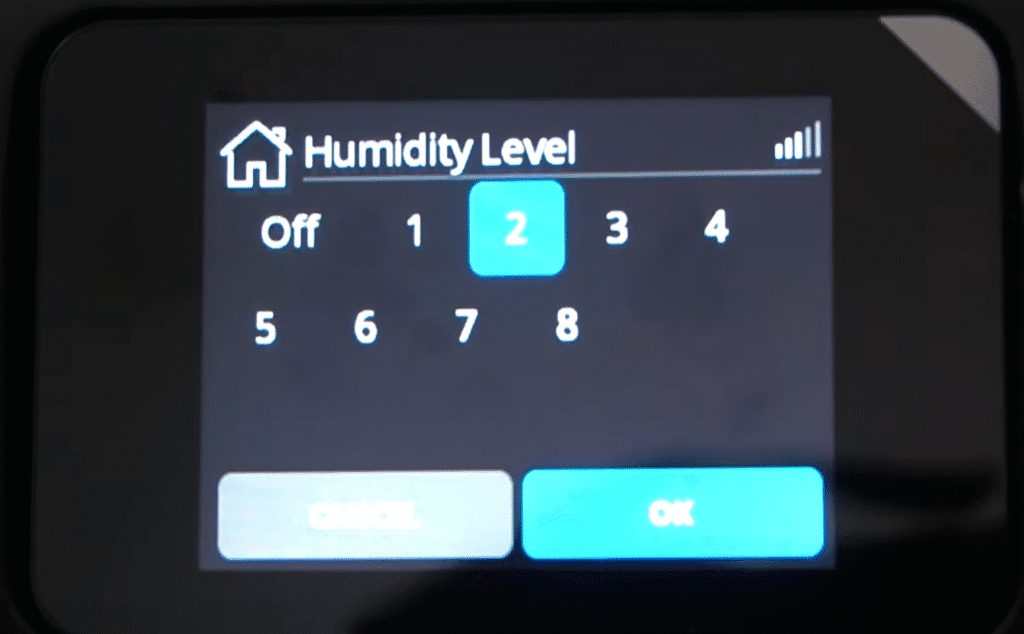
Pressure Settings and Therapy Customization
Pressure range varies between CPAP models, with most sleep apnea patients requiring 6-14 cm H2O.
Ensure your chosen integrated CPAP humidifier system can deliver your prescribed pressure levels. Many units include ramp features that start therapy at lower pressure and gradually increase to prescribed levels, making adjustment easier for new users or those sensitive to higher pressures.
Expiratory pressure relief reduces air pressure during exhalation, improving comfort against airflow resistance. This feature proves especially valuable for users requiring higher pressure settings for effective sleep apnea therapy.
Comfort and Compatibility Features
Mask compatibility affects therapy effectiveness, though most CPAP masks work with standard machines. Advanced features may require specific mask-machine combinations, so verify compatibility before purchasing.
Automatic leak compensation adjusts pressure to maintain effective therapy despite imperfect mask seals. This feature helps active sleepers or users still adjusting to CPAP masks maintain consistent treatment.
Practical Considerations
If you often camp or travel to areas without reliable electricity, consider a CPAP machine that offers battery power options. Some machines have integrated batteries, while others can connect to external battery packs.
Altitude adjustment automatically calibrates therapy effectiveness regardless of elevation changes, important for high-altitude residents or frequent travelers.
Warranty and Support
Warranty coverage and customer support availability impact long-term satisfaction.
Insurance coverage varies by provider and model, so verify which CPAP units qualify under your plan before finalizing purchases.
If you’re particularly interested in tracking your therapy progress, look for a machine with comprehensive data recording capabilities. Some machines can track not just basic usage data, and detailed information about apnea events, leaks, and more.
Which is the Best CPAP Machine with Humidifier for You?
Finding the best CPAP machine with a built-in humidifier requires evaluating your specific needs against available features. Integrated humidification systems offer streamlined operation compared to separate attachments, while auto-adjusting pressure technology provides personalized therapy delivery.
Key considerations include noise levels for peaceful sleep, data tracking capabilities for monitoring progress, and heated tubing compatibility to reduce condensation. Travel-friendly designs matter for frequent travelers, while smart connectivity features may be more important to you.
The models reviewed here represent current market leaders in build quality, feature sets, and user ratings. Your healthcare provider can help determine which combination of pressure settings, humidification levels, and advanced features aligns with your prescribed therapy requirements and personal preferences for optimal sleep apnea treatment.
Frequently Asked Questions
What is a CPAP machine?
A CPAP (Continuous Positive Airway Pressure) machine is a device used to treat sleep apnea. It delivers a constant flow of pressurized air through a mask to keep your airway open during sleep.
How does a CPAP humidifier work?
A CPAP humidifier adds moisture to the air delivered by the CPAP machine. This helps prevent dryness and irritation in your nose, mouth, and throat, making therapy more comfortable.
Can I use a CPAP machine without a humidifier?
Yes, you can use a CPAP machine without a humidifier. However, many users find that humidification significantly improves comfort and reduces side effects like dry mouth or nasal congestion.
How often should I clean my CPAP humidifier?
You should clean your CPAP humidifier chamber daily with mild soap and water. Rinse thoroughly and allow it to air dry.
Deep cleaning should be done weekly.
What is rainout in CPAP therapy?
Rainout refers to condensation that forms in the CPAP tubing when the humidified air cools. This can result in water droplets being delivered to your mask, causing discomfort.
How can I prevent rainout in my CPAP tubing?
Using a heated tube, adjusting your humidifier settings, or insulating your tubing can help prevent rainout. Some machines also have automatic features to reduce rainout.
Are CPAP machines with built-in humidifiers more expensive?
CPAP machines with built-in humidifiers are often more expensive than basic models without humidification. However, they can provide better comfort and therapy adherence, potentially making them a worthwhile investment.
Can I travel with a CPAP machine that has a built-in humidifier?
Yes, you can travel with a CPAP machine that has a built-in humidifier. However, some models are more travel-friendly than others. Consider factors like size, weight, and whether the machine can operate without the humidifier for short trips.
How long do CPAP humidifiers last?
With proper care and maintenance, a CPAP humidifier can last as long as the CPAP machine itself, typically 3-5 years. However, the water chamber may need to be replaced more frequently.
Can I use tap water in my CPAP humidifier?
While you can use tap water, distilled water is recommended for CPAP humidifiers. Distilled water helps prevent mineral buildup in the humidifier and reduces the risk of breathing in harmful microorganisms.
Related Reading
- CPAP Cleaning Machine for ResMed AirSense 10
- Top ResMed CPAP Masks for Side Sleepers
- Best Beds for Sleep Apnea (2025)
- Fiber Filled CPAP Pillows
- CPAP Mask Liners for ResMed f30i and f20
Health disclaimer: The information in this article is general and not a substitute for professional medical advice, diagnosis, or treatment. CPAP devices (and pressure settings) require a prescription and guidance from a qualified clinician. Always follow your provider’s instructions and the manufacturer’s user manual for setup, humidifier use, heated tubing, and cleaning. If you have concerns about dryness, rainout, or therapy comfort, speak with your healthcare provider before changing your equipment or settings.
